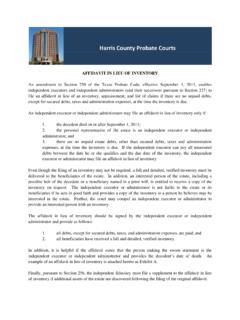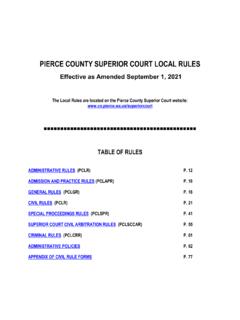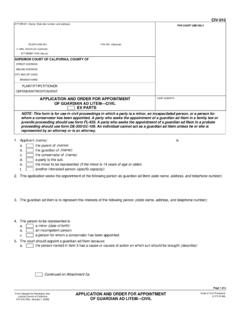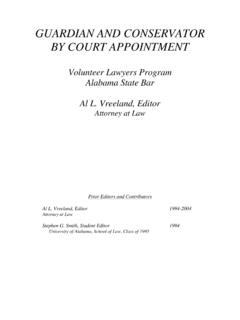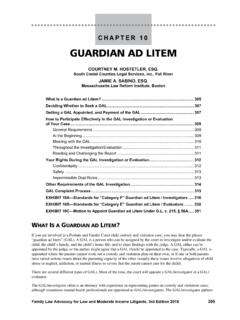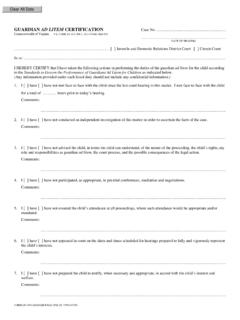Transcription of Harris County Probate Courts The Ad Litem Manual for ...
1 Harris County Probate Courts The Ad Litem Manual for Heirship Proceedings Prepared by The Honorable Steve M. King Tarrant County Probate Court Number One Tarrant County Courthouse 100 West Weatherford, Rm. 260-A Fort Worth, Texas 76196-0241 Revision Date June 2011 The Honorable Christine Butts Harris County Probate Court Number Four Adapted for Harris County Probate Courts 2 TABLE OF CONTENTS A. Introduction .. 4 1. The Plain Jane Case .. 4 2. The Mystery Case .. 4 B. Statutory Bases for Heirship Proceedings .. 4 1. Application. Tex. Prob. Code 49.. 4 2. Citation. Tex. Prob. Code 50.. 4 3. Appointment of Attorney Ad Litem .. 5 4. Evidence in Heirship Proceedings .. 5 5. Heirship Judgment. Tex. Prob. Code 54.. 6 C. Scope of Heirship Determinations .. 6 D. Duty and Standing of the Attorney Ad Litem .. 6 E. Pointers on Different Types of Cases .. 6 1. The Plain Jane Case .. 6 2. The Mystery Case .. 7 F.
2 Due Diligence .. 7 1. Before the Day of the Hearing .. 7 2. Hearing Day Before the Hearing .. 8 3. Hearing Day In the Hearing .. 8 G. Time Records and Fee Applications .. 9 1. Fee Standards .. 9 2. Typical Fees .. 9 3. Complex Cases .. 9 4. Time Records .. 9 5. Application for Payment of Fees .. 10 H. Dealing with the Clerk s Office and the Court .. 10 1. The Clerk s Office .. 10 2. Court Staff .. 10 3. Paperwork .. 10 I. Distribution of the Estate: Specific Concerns .. 10 1. Listing and Proving Beneficial Interests .. 10 2. Imbedded Heirships .. 10 3 3. Half-Blood Heirs .. 11 4. Effect of 11 5. The Slayer s Rule .. 11 6. DNA Evidence .. 11 J. Miscellaneous Practice Pointers .. 12 Appendix A Answer of Attorney ad Litem in Heirship Proceeding .. 13 Appendix B Application for Ad Litem Fees .. 14 Appendix C Judgment Declaring Heirship .. 16 4 A. Introduction All heirship determinations require (1) the appointment of an Attorney Ad Litem and (2) citation by publication.
3 Tex. Prob. Code 53(c); Tex. R. Civ. Proc. 244. If you are appointed as an Attorney Ad Litem in an heirship proceeding in Harris County , you should become familiar with the Courts guidelines, When There is No Will Key Points for Filing an Heirship and/or Administration, available on the Courts website. Although designed for the applicant s attorney, the document covers information that every Attorney Ad Litem in this court should know. The following materials are designed to assist you, the practitioner acting as Attorney Ad Litem , in adequately representing your clients, even though you (in most instances) will never meet them and (in some instances) they won t exist, except in legal fiction. Two general situations will be addressed: Proving Up the Obvious vs. Solving an Old Mystery. In many cases, you merely will be verifying otherwise straightforward family history facts.
4 In other cases, the existence of heirs will not be disclosed, either from ulterior motives or honest ignorance. In yet other situations, the existence of heirs on the other side of the family is simply a mystery. 1. The Plain Jane Case If your principal job is to confirm (a) that the application is correct, (b) that there appears to be no controversy in the proceeding, and (c) that the applicant has carried his/her burden of proof, your checklist is relatively simple. These are by far the most common cases; and for these cases, your fee should be in the range of $400 to $600. 2. The Mystery Case If it appears that there are heirs whose very existence as well as whereabouts are unknown, your job is much harder. The applicant may need to hire a genealogist or skip tracer. Keep your time, and understand what resources will be available to pay your fee.
5 Your checklist is constrained by your imagination, the size of the estate, and what the judge considers to be a reasonable effort to locate the missing heirs. B. Statutory Bases for Heirship Proceedings Heirship is the relationship between a decedent (a person who dies owning or entitled to property and who leaves no will, or whose will fails to effectively dispose of all of that person s property) and an heir (the person designated by the applicable Laws of Descent and Distribution to receive the property). Tex. Prob. Code 48. 1. Application. Tex. Prob. Code 49. A representative, a person claiming part of the estate, or a secured creditor can apply to determine heirship. The application should contain the information listed in Tex. Prob. Code 49(a)(1)-(8), and shall be supported by an affidavit stating that all facts are true and that nothing has been omitted.
6 2. Citation. Tex. Prob. Code 50. This citation is different from service required for an administration. (a) Harris County Probate Courts require personal service on, or an appropriate waiver from, all distributees whose names and addresses can be found with reasonable diligence. A parent, managing conservator, guardian , Attorney Ad Litem , or guardian Ad Litem of a distributee may waive service of citation for an heir under the age of twelve (12). (b) Publication service on all unknown heirs and heirs whose addresses cannot be found in the County of the proceeding and the County of the decedent s last residence. 5 (c) Posted citation in the County where proceedings are commenced and where the decedent last resided, except where publication is used as in (b). 3. Appointment of Attorney Ad Litem A court must appoint an Attorney Ad Litem for all unknown heirs.
7 Tex. Prob. Code 53(c). A court may appoint an Attorney Ad Litem for all the living heirs whose names or whereabouts are unknown or who are incapacitated if, in the court s discretion, it finds that the appointment is necessary to protect the interests of the living heir or incapacitated person. Tex. Prob. Code 53. Each Attorney Ad Litem appointed under this section is entitled to reasonable compensation for services in the amount set by the court to be taxed as costs in the proceeding. Tex. Prob. Code 34A. 4. Evidence in Heirship Proceedings As a general rule in an heirship hearing, Harris County Probate Courts require the live testimony of two disinterested witnesses with personal knowledge regarding the family history of the decedent and the heirs. This includes information regarding identity and relationship of the family members, births, deaths, and marriages, as well as the order of deaths and marriages.
8 Harris County Probate Courts require all evidence from an heirship hearing to be reduced to writing and subscribed and sworn to by the witnesses. Tex. Prob. Code 53(a). Should a witness not be able to provide live testimony, the testimony of the witness may be by deposition, written or oral, taken in accordance with the Texas Rules of Civil Procedure, except as modified by the Probate Code. If depositions are used, the Attorney Ad Litem must participate in the deposition process so that the opportunity to cross-examine the witnesses is preserved. The methods for using depositions in a Probate proceeding are summarized in the Courts guidelines, When There is No Will Key Points for Filing an Heirship and/or Administration. Affidavits of heirship and judgments concerning heirship or family identity, as authorized by Tex.
9 Prob. Code 52, are prima facie evidence of such matters, but only if they have been of record in the records of a County or district court for at least five years by the time the instant heirship proceeding is commenced. Any errors contained in such recorded instruments may be proved by interested parties during the heirship proceeding. Id. This provision is not exclusive of any other methods of proof available under other rules or laws. Id. What this means is: (a) Affidavits of heirship filed expressly for the current proceeding are inadmissible and essentially a waste of time. Compton v. WWV Enterprises, 679 668 (Tex. App. Eastland 1984, no pet.) (b) Recorded documents such as birth, marriage, and death certificates are admissible because of Tex. Evid. Rule 902(1) ( Domestic Public Documents Under Seal ).
10 (c) Written statements of fact concerning personal or family history contained in family Bibles, genealogies, charts, engravings on rings, inscriptions on family portraits, engravings on urns, crypts or tombstones, etc. are specifically excepted from the hearsay rule, Tex. Evid. Rule 803(13), but are subject to the twenty-year authentication requirement of Tex. Evid. Rule 901(b)(8). (d) On the other hand, oral statements of reputation concerning personal or family history, Tex. Evid. Rule 803(19), are hearsay exceptions without any authentication requirement other than a demonstration of personal knowledge. Tex. Evid. Rule 901(b)(1). 6 The lack of specifics regarding testimony in the heirship provisions of the Probate Code would indicate that, beyond requiring that level of proof which would create in the trier of fact a firm belief or conviction as to the truth of the allegations sought to be established, Transportation Ins.

